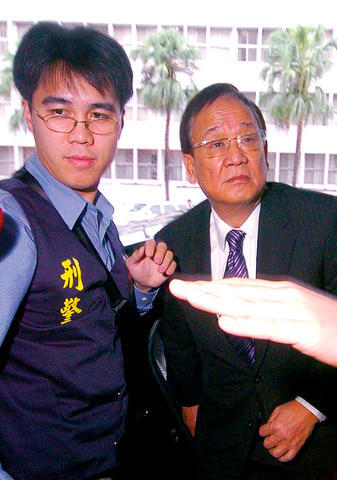Taipei prosecutors yesterday questioned a key suspect in their investigation into the downfall of the Alexander Group (
Taipei District Prosecutors Office spokesman Lin Ching-tsun (林錦村) yesterday said the suspect, Tseng Hsiao-tsun (曾曉村), was questioned by prosecutors yesterday afternoon. Prosecutors suspect he is a member of a group under investigation for defrauding companies suffering financial difficulties.
Lin said a woman named Chen Ai-hui (陳愛惠) was a university classmate of Tang Hsin-ru (唐心如), the younger sister of Alexander chairwoman Candy Tang (唐雅君). Chen introduced Lee Yung-hua (李永華), a suspected member of the alleged defrauding group, to the Tangs to finance the Alexander Group. Lee is suspected of then embezzling funds from Alexander Group.

PHOTO: WANG MIN-WEI, TAIPEI TIMES
Lee was released on NT$1 million (US$31,000) bail on Monday.
Lin said the group is under suspicion of funding companies in financial difficulties but then actually defrauding or plundering those companies.
Lin also said that Tseng has been accused in a separate case of embezzling funds from a company called San Chou Heng (三州行). That case is also under investigation
In the face of financial difficulties, the parent company of the nation's leading fitness centers, Alexander Health Clubs (亞力山大健康休閒俱樂部), last week shut down all 20 of its branches without prior notice to its 20,000 members or the company's 2,000 employees.
Candy Tang and Tang Hsin-ru, were released on NT$2 million bail each after they were detained on suspicion of defrauding health club customers. Tseng was also released last night on NT$2 million bail.
Prosecutors are investigating whether Candy Tang's actions constitute fraud under criminal law, Lin said.
Lin said that Candy Tang told prosecutors that Lee Yung-hua had agreed to finance her health club, but actually defrauded her of nearly NT$100 million, which led prosecutors to open their investigation into the group.

Taiwan’s technology protection rules prohibits Taiwan Semiconductor Manufacturing Co (TSMC, 台積電) from producing 2-nanometer chips abroad, so the company must keep its most cutting-edge technology at home, Minister of Economic Affairs J.W. Kuo (郭智輝) said yesterday. Kuo made the remarks in response to concerns that TSMC might be forced to produce advanced 2-nanometer chips at its fabs in Arizona ahead of schedule after former US president Donald Trump was re-elected as the next US president on Tuesday. “Since Taiwan has related regulations to protect its own technologies, TSMC cannot produce 2-nanometer chips overseas currently,” Kuo said at a meeting of the legislature’s

TECH WAR CONTINUES: The suspension of TSMC AI chips and GPUs would be a heavy blow to China’s chip designers and would affect its competitive edge Taiwan Semiconductor Manufacturing Co (TSMC, 台積電), the world’s biggest contract chipmaker, is reportedly to halt supply of artificial intelligence (AI) chips and graphics processing units (GPUs) made on 7-nanometer or more advanced process technologies from next week in order to comply with US Department of Commerce rules. TSMC has sent e-mails to its Chinese AI customers, informing them about the suspension starting on Monday, Chinese online news outlet Ijiwei.com (愛集微) reported yesterday. The US Department of Commerce has not formally unveiled further semiconductor measures against China yet. “TSMC does not comment on market rumors. TSMC is a law-abiding company and we are

FLEXIBLE: Taiwan can develop its own ground station equipment, and has highly competitive manufacturers and suppliers with diversified production, the MOEA said The Ministry of Economic Affairs (MOEA) yesterday disputed reports that suppliers to US-based Space Exploration Technologies Corp (SpaceX) had been asked to move production out of Taiwan. Reuters had reported on Tuesday last week that Elon Musk-owned SpaceX had asked their manufacturers to produce outside of Taiwan given geopolitical risks and that at least one Taiwanese supplier had been pushed to relocate production to Vietnam. SpaceX’s requests place a renewed focus on the contentious relationship Musk has had with Taiwan, especially after he said last year that Taiwan is an “integral part” of China, sparking sharp criticism from Taiwanese authorities. The ministry said

US President Joe Biden’s administration is racing to complete CHIPS and Science Act agreements with companies such as Intel Corp and Samsung Electronics Co, aiming to shore up one of its signature initiatives before US president-elect Donald Trump enters the White House. The US Department of Commerce has allocated more than 90 percent of the US$39 billion in grants under the act, a landmark law enacted in 2022 designed to rebuild the domestic chip industry. However, the agency has only announced one binding agreement so far. The next two months would prove critical for more than 20 companies still in the process